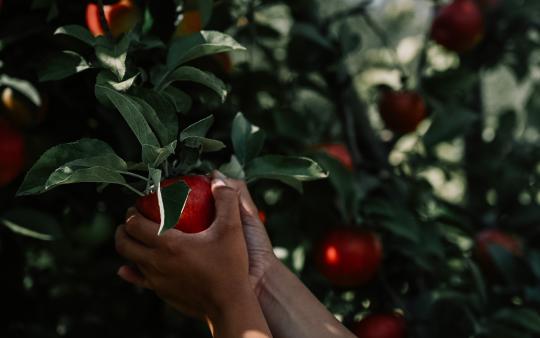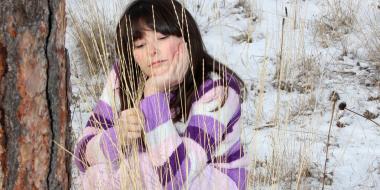“Code red for humanity,” “Stark warnings for the warming planet,” “A hotter future is now inevitable”. Recent headlines about the state of the climate could be likened to a science fiction movie, painting the picture of a calamitous future, as every corner of the world seemingly felt the impacts of a warming planet all at once this past summer.
What was once something that was happening “somewhere else,” it seems everyone now has a story about how they have been impacted by the extreme weather events that are becoming more commonplace around the world. Growing up in southern Canada, I remember the snow lasting from November to May. My father spent hours shovelling the driveway while my brother and I flew down the snow mountains he created. There were snow tunnels that connected to our neighbours’ yards, snowball fights, and sledding - the only thing better was the hot chocolate that waited for us once we came inside. That was all a part of the Canadian identity I grew up with. My children, however, have not experienced those Canadian winters that I was so fond of in the same way. When my son received a GT snow racer for Christmas years ago, he did not have an opportunity to use it until March. That was the winter I realised that the reality of a changing climate was happening here and now, and it was a pivotal moment for me in my journey to fight for a habitable future for my children.
What is the IPCC?
The Intergovernmental Panel on Climate Change (IPCC) is the United Nations body for assessing the science related to climate change. The IPCC was established in 1988 to provide policymakers with regular scientific assessments on climate change, its implications and potential future risks, as well as to put forward adaptation and mitigation strategies. Through the IPCC, thousands of experts around the world assess the most recent scientific climate data and provide a comprehensive report of their findings every five to seven years. These reports are then reviewed by policymakers to assist them in setting targets and drafting legislation.
What the Recent IPCC Report Means for Us
The IPCC released their latest report, AR6, on August 9th of 2021, and its findings are what many of us already knew - we have no time to waste. In order to avoid the worst effects of climate change, we must limit warming to a maximum of 1.5°C in comparison to pre-industrial levels. The AR6 report reviewed five potential scenarios, ranging from very low emissions to very high emissions between now and the turn of the next century. In a very low emission scenario, we can limit temperature rise to 1.6°C by 2050 and reduce it to 1.4°C by 2100. This would be achievable through aggressive policy change and immediate action. In a high emission scenario, temperatures could climb to 2.4°C by 2050 and each 4.4°C by 2100. There is a spectrum of possible futures that exist for humanity depending on the path we choose. The good news? The worst effects of sea level rise, food and water scarcity, extreme weather events, irreversible loss of biodiversity and more can be avoided. Our future is not set in stone.
Our call to action
My biggest takeaway from the latest IPCC report is not that we are doomed - it is that the amount of warming we see is entirely up to us. We’ve got the whole world in our hands, and I choose to believe that humanity will rise to the climate challenge. What we do next is what will matter most. Whether you feel enraged, scared, or hopeful, I urge you to harness those feelings and act. Our response from this point forward could drastically alter our future on this planet. This is a chance to show our children we will fight for them and the generations that will follow. If you aren’t sure where to start, here are a few simple ways to participate in environmental activism.
Vote
Who we elect to lead us through the climate crisis could be the difference between a very low emission scenario and a very high emission scenario. Ask questions of your representatives and/or candidates, learn about their platforms and choose the person you feel is best for the job. Hold elected leaders accountable by signing petitions for matters that are important to you, writing or calling them.
Have a Climate Conversation
Though it may be uncomfortable at times, speaking to those around us about climate and environmentally focused topics provides us with an opportunity to vocalize our feelings and open someone up to an alternative viewpoint. If you aren’t feeling comfortable addressing the bigger topics, try integrating something such as a small change you’ve made in your household into your conversation. This can open the door for bigger conversations down the road. You can never underestimate the power of planting a seed.
Get Your Children Involved
Raising children is an opportunity to foster and develop a beautiful new generation of eco warriors who will fight for what they love. Lead by example, get them involved in the conversation, spend time outside and learn alongside them. The youth of today have proven to be a beacon of hope in the fight for environmental justice. Let’s encourage them to continue carrying the torch of environmental stewardship. It is their future, after all.
Vote With Your Dollar
In a world where money tends to do a lot of talking, how you spend it is an indication of what matters most to you. Shopping locally, buying second hand when possible, and supporting companies with transparent and ethical values for the treatment of both people and our planet, are ways to break the business-as-usual pattern of excessive consumption.
Get Involved Within Your Community
When things feel heavy, participating in something with an immediate noticeable difference can be rewarding and renewing. Try joining a local tree planting initiative or community clean up!
Facing the Sun
When my son asked me with a look of disappointment whether there would be snow over the Christmas break this year, my honest answer was that I don’t know. While I cannot predict the outcome of this winter’s snowfall or humanity’s response to the climate crisis, I do know this - we control the narrative for our children’s futures. Losing faith is the first step in losing the battle, and there is so much to fight for. Facing the sun is a choice a sunflower makes every day. Let’s face the sun and remain hopeful.
You may also enjoy: No Small Thing: Parenting and Child Advocacy, Talking to Kids About Climate Change, and 6 Totally Manageable Ideas for Zero Waste Parenting.






